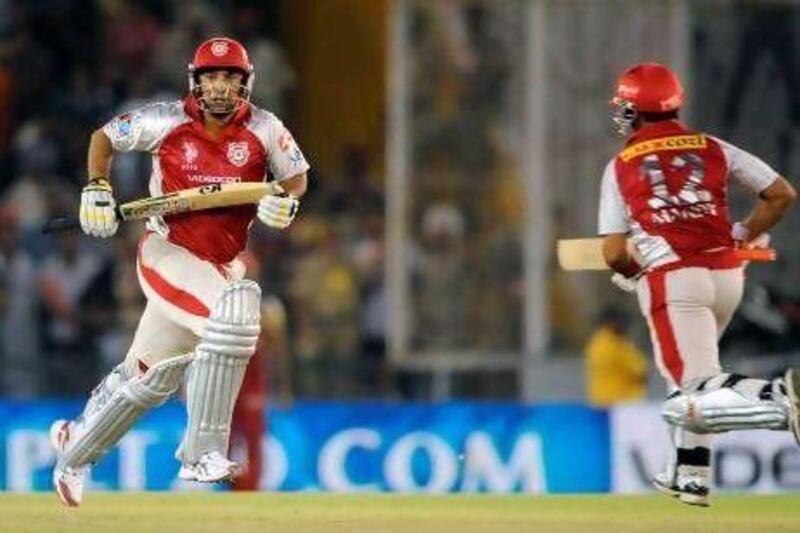Azhar Mahmood finally made his Indian Premier League (IPL) debut for Kings XI Punjab on Friday, belting an aggressive 14-ball 33.
It marked the end of frustrating wait for the Pakistan-born cricketer while his visa issues were resolved.
"He has shown us a trailer today," said Sanjay Manjrekar in the IPL broadcast studio during the innings break.
A trailer of what you might wonder?
Manjrekar, a former India batting star with great memories of the epic battles between India and Pakistan in Sharjah, avoided spelling that out, but he was certainly referring to the absence in the tournament of players from across India's western border.
"They are game changers," he said. "Pakistani cricketers are naturally undisciplined with their cricket and that suits Twenty20 cricket."
These "game changers" showed their flair in the opening season of the IPL, with Sohail Tanvir's 22 wickets playing a big part in the Rajasthan Royals' triumph. He also hit the winning boundary in the final against Chennai Super Kings.
Shahid Afridi turned out for Deccan Chargers that season and Shoaib Akhtar had a sensational debut for Kolkata Knight Riders at a packed Eden Gardens. He had caused a riot at the same venue in 1999 after a controversial run-out of Sachin Tendulkar.
The Pakistani entertainers, however, have been ignored for the last three years by a tournament which considers itself as the pinnacle of entertainment in the sport.
Mahmood got lucky because he holds a British passport as well and hence was picked up by the Kings XI for US$200,000 (Dh734,640) at the auctions.
But Mahmood does not consider himself British. "I belong to Pakistan," he said in an interview last week. The visa issued to him by India is also as a Pakistani national.
This means there are no bureaucratic obstacles to Pakistani players participating in the IPL. There is no government opposition either since various other teams, including hockey, have travelled across the borders.
So why are the Pakistani cricketers treated like pariahs by the IPL? Why were they embarrassed by the franchises at the 2010 auctions? Rajiv Shukla, the vice-president of the Board of Control for Cricket in India (BCCI) and chairman of the IPL, tried to explain.
"No one is against Pakistan or Pakistani players in India or else we would not have allowed Pakistani commentators or umpires in the IPL 5 season," Shukla said.
"The reality is that everything is tied to the resumption of bilateral cricket ties between the two countries. When bilateral relations resume between the two boards the IPL will also not be a problem for Pakistani players."
Should it not be the other way around though? Allowing Pakistan cricketers to play in India, away from the bitterness and jingoism that accompanies international matches between the two countries, would create the right atmosphere for the resumption of bilateral cricketing ties.
Certainly, no fan in India considers Mahmood to be British. He is a Pakistani to them and if they can celebrate his fours and sixes, why would they have a problem against others from his nation?
Imagine Afridi being a part of Mumbai Indians and winning a game for them with a last-ball six. Would the Shiv Sena (a Hindu nationalist party) really complain, hold morchas (protest marches), burn effigies or go and dig up the pitch at the Wankhede Stadium, like they did in 1991?
Umar Gul, widely considered the best Twenty20 bowler, would be the toast of Pune Warriors if he were to bowl a fantastic last over against Mumbai at the Sahara Stadium, dismissing Tendulkar with his trademark yorker. The Marathas of Pune would be proud of a Pakistani.
Saeed Ajmal, with his wizardry, and Umar Akmal, with his audacity, could make similar impacts, doing more for the relations between the two nations than any political summit.
The BCCI should not need reminding of the late Pakistan president Zia-ul-Haq's use of "cricket diplomacy" to pull back the two nations from the brink of war. Or the "ping pong diplomacy" of 1971 that turned the tide in the relations between the US and China.
People from both the nations have friends and families across the border, and nobody gains from this acrimony. The demonising needs to stop. Mahmood is as proud of the IPL as any Indian and considers Zaheer Khan, Ashish Nehra and Harbhajan Singh among his best friends.
"In fact, Nehra even helped me sort the recent visa trouble I faced," he said.
Mahmood, a Punjabi whose grandfather came from the Indian city of Amritsar, is also relishing the opportunity to speak in his mother tongue.
"In the UK, I converse with my wife in Urdu and with the rest of people, I have to talk in English," he said. "I am so delighted to be speaking in chaste Punjabi here."
To put it simply, Mahmood is feeling at home. Indians who have travelled across the border, will echo similar sentiments. These people-to-people contacts, therefore, are essential to keep the extremists at bay in the two countries. The artists, entertainers and other sportsmen are playing their part. It is time cricket and the IPL join the circle of positivity.
Follow us
[ @SprtNationalUAE ]





